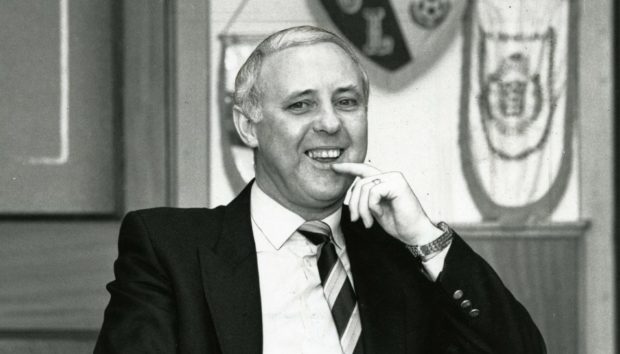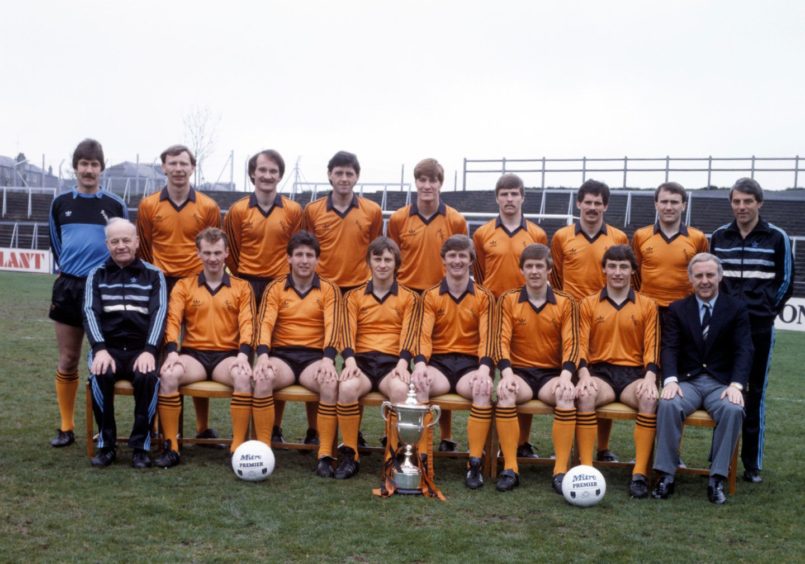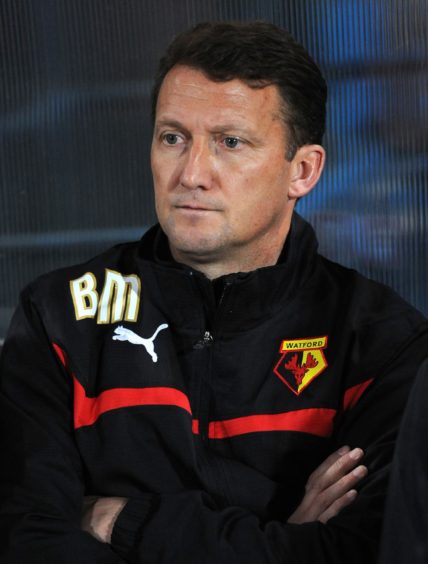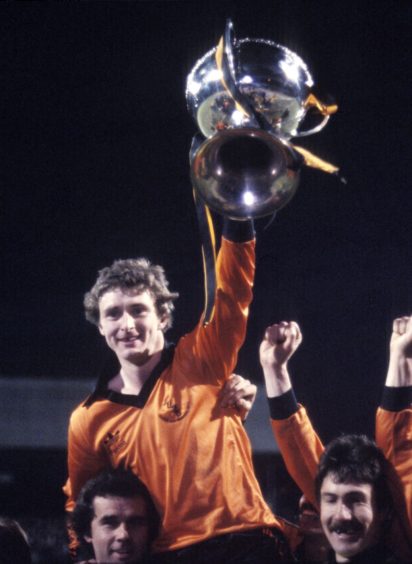The Jim McLean era saw Dundee United blessed with a multitude of fabulous footballers.
Picking a starting XI of the very best, therefore, is a challenge but it is one Ian Roache has agreed to take on.
There are many greats who have not made it into his select but it is a personal choice and every United fan who witnessed McLean’s teams play will have their own picks.
Also, this is a side of individuals and nothing would surpass, as a unit, the team that won the Premier Division title in 1983.
1 – Hamish McAlpine
688 appearances. Three goals.
The first choice is the easiest selection of the lot. There was really only one number one when it came to McLean and United.
The two men enjoyed an eventful relationship – the goalie was memorably sent home from a pre-season trip to Japan in 1979 after a fallout with his boss – but there was enormous mutual respect between them.
McAlpine is a rarity in this team because he was not signed by McLean but instead by his predecessor Jerry Kerr in 1966.
McAlpine’s debut would come against Hearts three years later. One of his great claims to fame is, of course, that he was United’s penalty taker for a time, his last goal coming in a 3-2 victory over Rangers at Ibrox in February 1977.
However, it was the heroics between the posts that made him the best of all Tannadice keepers, with a magnificent man-of-the-match display against Manchester United at Old Trafford in the Uefa Cup in November 1984 the most memorable of the McAlpine displays that I witnessed.
2 – Maurice Malpas
830 appearances. 26 goals.
Malpas is not only a club great but is also one of the finest Scotland defenders of the modern era, representing his country no fewer than 55 times.
Remarkably, the left-back was still a part-time player – he was studying for a degree in electronic engineering – when winning the Premier League title with United in 1983 and earning his first cap against France the following year.
He would also, of course, become the club’s first Scottish Cup-winning captain in 1994 after McLean had left the dugout and been replaced by Ivan Golac.
Malpas is a towering figure in the Tangerines’ history.
3 – Richard Gough
256 appearances. 37 goals.
Born in Sweden and raised in South Africa, the 18-year-old Gough was signed by McLean in May 1980.
He made his first-team debut a year later against Celtic and, after a bout of homesickness, he returned to Tannadice to become a regular in McLean’s greatest side.
Due to the club being blessed with the Hegarty-Narey central defensive partnership Gough couldn’t get regular football in his favoured position and moved to Tottenham Hotspur for a fee of £750,000 in the summer of 1986, eventually switching to Rangers a year and a bit later.
The great thing about Gough was he gave you serious goal threat as well defensive brilliance.
In particular, his nine goals in the championship-winning campaign in 82-83 proved invaluable.
4 – Billy McKinlay
284 appearances. 31 goals.
McKinlay beat off some illustrious names for this slot, including Jim McInally, Dave Bowman, John Holt and Billy Kirkwood.
The only player in this selection who was still at Tannadice when McLean stepped down as manager, McKinlay left United in September 1995 for a £1.75 million move to Blackburn Rovers.
His going away gift to the supporters was a hat-trick against Dundee in a derby at Dens.
“Badger” made his debut aged just 17 against Hibs in November 1986 and played a part in the run to that season’s Uefa Cup final.
He was also man-of-the-match against Celtic despite finishing on the losing side of the 88 Scottish Cup final.
He then suffered personal heartbreak in 94. He played in every game bar the final, with suspension ruling him out as United beat Rangers at Hampden.
McKinlay was a superb passer of the ball, chipped in with key goals and played 29 times for Scotland.
He also makes it into the team to represent the post-title-winning era and is someone who, had he been around at the time, was good enough to get into the team that were crowned champions.
5 – Paul Hegarty
707 appearances. 82 goals.
Famously, McLean signed this legendary centre-half as a striker, with Hegarty joining from Hamilton Accies in November 1974 for a fee of £27,500.
A look at the number of goals he grabbed – particularly in Europe – will show how “Heggie” never lost his scoring touch.
It was as a brilliant-in-the-air centre-back alongside Dave Narey, however, that he left his mark on the Tangerines and Scottish football.
It is a tremendous compliment to Hegarty that of all the talents and leaders McLean had at his disposal he chose him to be his captain.
Hegarty would go on to lift the Premier Division trophy as well as winning two League Cups. United, Hegarty and McLean were made for each other and brought out the best in each other.
A modest, polite gentleman off the park but a formidable, tough leader on the pitch.
6 – David Narey
872 appearances. 36 goals.
One Davie Narey, there’s only one Davie Narey. He is the man I regard as the greatest United player of all time, just beating Paul Sturrock to the accolade.
Narey’s central defensive partnership with Hegarty is the stuff of legend and, as far as Scotland caps are concerned, the pair of them were probably unfortunate to have been playing in the same era as Aberdeen’s Willie Miller and Alex McLeish, as well as Liverpool’s Alan Hansen.
Beyond the city of Dundee, Narey is probably best known for his goal for the Scots against Brazil in the 1982 World Cup in Spain but in his home town he is revered as the Dundonian who played like a Brazilian.
Indeed, Narey was comfortable in any company and could have starred for any of the giants in England, Spain, Germany or Italy.
Instead, he chose to stay and grace Tannadice with his skill, intelligence and leadership. We can all be thankful for that.
7 – Graeme Payne
293 appearances. 21 goals.
Any young United fans looking for a reference point regarding Payne should think Ryan Gauld only better.
Payne was a particular favourite of McLean’s because of his natural talent.
He was United’s very own version of Jimmy Johnstone and was usually compared favourably to Aberdeen’s Gordon Strachan when both were strutting their stuff for the so-called New Firm.
Perhaps it was because he was so good with the ball at his feet that the wee man – he was only 5 ft 6 in – seemed to get more pelters from the manager than other team-mates.
McLean wanted more out of him because he knew the quality was there. His gaffer dedicated the 1980 League Cup win over Dundee to Payne after leaving the winger out of the team that beat Aberdeen a year earlier for tactical reasons.
That was McLean’s way of saying sorry and in that gesture can be seen the deepest of respect between manager and player.
8 – Ralph Milne
287 appearances. 75 goals.
Milne was the scorer of the most important – and I would argue most beautiful – goal in United’s history when they won the league at Dens.
I would also mention the double he grabbed against Aberdeen at Pittodrie in March of that season before being sent off.
That 2-1 win helped the Tangerines believe they could be title contenders.
In the McLean years, there were few sights more thrilling than watching Milne race up the wing like an Olympic sprinter. His pace was explosive and his finishing was exceptional.
Milne, who died in 2015, was quite simply loved by United fans.
It is a particular bugbear of mine that one of the finest footballers to hail from the city is not given the respect he is due for a career that saw him tear top continental and domestic opposition apart on a regular basis.
If you were there to witness it, you knew how magical Milne was and McLean certainly acknowledged his worth to the team.
9 – Andy Gray
95 appearances. 47 goals.
McLean signed Gray from Clydebank Strollers in May 1973 and he made his debut for United just three months later against Motherwell.
The striker has the fewest number of appearances by a long way in this list but some people may still be surprised to see he fell just short of a century, including the 1974 Scottish Cup final against Celtic, before heading to the bright lights of England.
Aged just 19, the frontman joined Aston Villa for a then United club record fee of £110,000 in the autumn of 75.
Gray’s inclusion in this team as main striker ahead of Davie Dodds will annoy some people, including my own family and friends.
But he is included because he personifies McLean’s ability to take young, raw players and help turn them into superstars, which is what Gray was as he led the line for the likes of Scotland, Villa, Wolves and, particularly, Everton.
Doddsie’s service to the Tangerines betters his but Gray stood out as the finest United player of McLean’s early years.
10 – Paul Sturrock
575 appearances. 171 goals.
Luggy was comfortably my favourite player growing up watching United and it was an absolute privilege to look on from the Shed as he terrorised opposition defences.
Just as Narey and Hegarty were unfortunate to have McLeish and Miller around when it came to international recognition, the same goes with Sturrock and the nation’s greatest-ever player: Kenny Dalglish.
The United frontman still won 20 caps and was one of the players who made up the Tangerines’ famous five at the World Cup in Mexico in 1986, along with Malpas, Gough, Narey and Bannon.
Sturrock was United’s gold dust, a player who combined pace with intelligence, composure with clinical finishing.
A hero of the League Cup wins with a goal against the Dons and two versus Dundee, Sturrock was also the man who played the pass to Milne for that goal at Dens in 83 and the star of so many Euro triumphs.
As I’ve said, for me he is the United player who runs Narey closest in the search for the greatest of all.
11 – Eamonn Bannon
440 appearances. 108 goals.
Bannon can be seen as the final ingredient in the McLean team that finally lifted silverware.
To the modern-day supporter, it will seem astonishing that a provincial club like United should be able to sign a talented young Scots winger from English giants Chelsea but that’s exactly what happened on October 30, 1979 when Bannon moved from Stamford Bridge to Tannadice for a fee £165,000.
It was a Scottish transfer record at the time but he was worth every penny.
Just two months after joining United, Bannon lined up for them in the League Cup replay final win over Aberdeen and was a key man 12 months later when they retained the trophy in the Dundee derby final.
Most famously of all, it was Bannon’s goal – a close-range shot after having his penalty saved – that proved to be the winner against the Dark Blues in the league decider in 83.
Bannon also netted one of the greatest European goals scored by a Scottish team when he went off on his mazy run against Borussia Monchengladbach in a quite remarkable 5-0 home win over the Germans in the Uefa Cup in 1981.
Don’t tell me Lionel Messi wouldn’t want that one on his CV!
Subs (please forgive me!): Billy Thomson, Doug Smith, John Holt, Billy Kirkwood, Dave Bowman, Kevin Gallacher, Davie Dodds.



